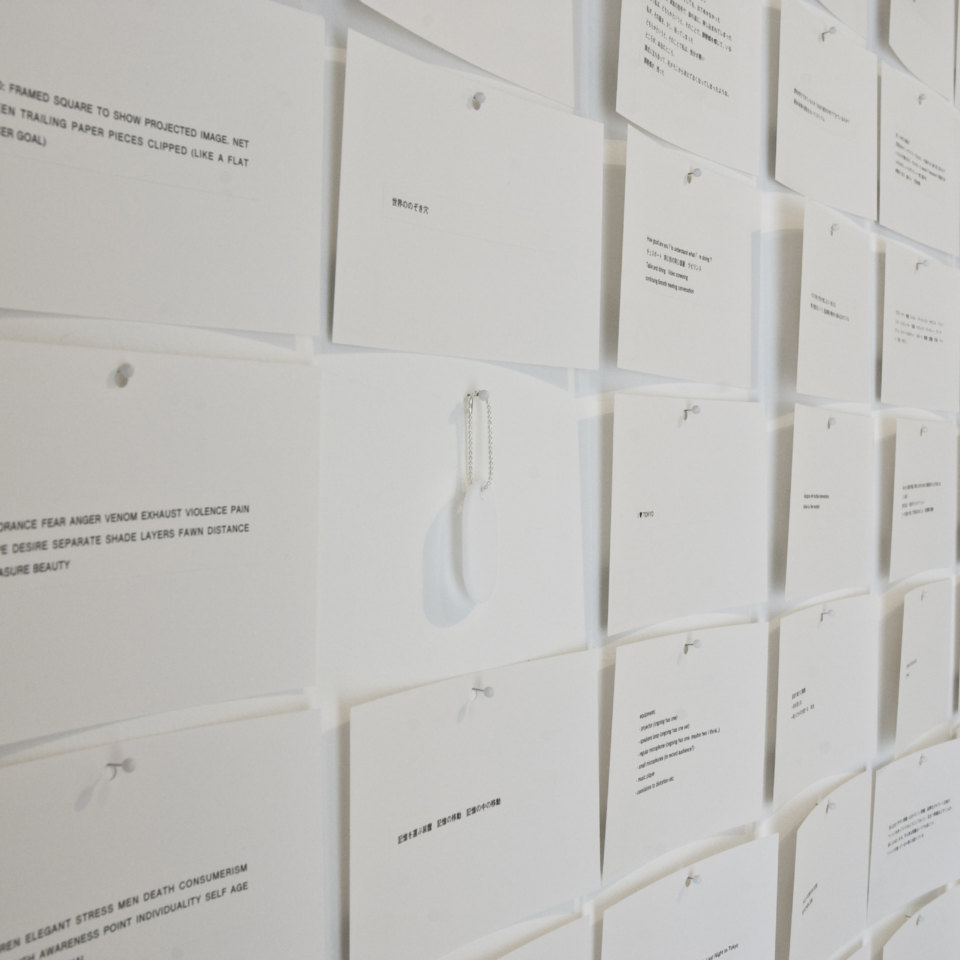Contents
Documentation of a set of six (plus one) conversation pieces held within ASSISTANT's retrospective “i.e.”.
Six (plus one) invited guests relayed their thoughts in turn, with Megumi Matsubara & Hiroi Ariyama.
Time — 13:00 - 20:00, Saturday, 18th December, 2010
Location — radlab
Megumi Matsubara (MM): Do you mind if we talk a little bit? This exhibition is playing with ‘retrospective’. It is kind of funny to talk about ‘retrospective’ in front of you who have a lot of work to look back on in retrospect. Everyone wants to see your work lined up in chronological order, in history. But here, we are just showing our work of only 10 years… such tiny amount of work of us; we are just playing with ‘retrospective,’ the idea of retrospective.

Sir Peter Cook & Megumi Matsubara & Hiroi Ariyama in conversation, 18:00-18:45, 18 Dec 2010
Photo by radlab
MM) Your Archigram archive is a massive amount of work. You have those references, but of course you’re always living in the present, you are constantly doing a new thing. In the lecture you gave in Tokyo this year, I thought that was very clear, compared to two years ago when you came to Japan. This time I heard from many who attended the lecture that they were so encouraged and fascinated by so many new things.
Since the year 2000, there have been so many Archigram retrospectives around the world. I started knowing you through Archigram’s work. I found Archigram book at my first project first semester at architecture school, and I was just totally fascinated.
We belong to different generations, but it was almost like a message from the past directly to me. For me it was a book. But you can always feel the past is very present, especially when there is Internet. Like there’s no time, the concept of time doesn’t exist. Inside the computer, that box, it doesn’t matter if it’s an old idea or a new idea when it appeals to you, there is no concept of time and it comes directly to you.In fact, you wouldn’t know if this word or image is old or new. It’s just a very fragmented picture of something, and that can communicate with you. Because I think we are living in the space where past/present/future is all mixed up, sort of, in some way. So, for someone like Peter, who has the very influential work in the 60s, and then there have been retrospectives, even so many of them, and then you come back with new things. Is ‘retrospective’ versus ‘new’? In truth, you had always been in the present…
I thought this idea ‘retrospective’ would be worth playing now. Because actually we’re not living that much relevant to ‘time’ as we knew it. That was my thought for this exhibition, and I want to ask you about it…
Peter Cook (PC): It’s not a question [laugh]!
MM) It’s not…! It’s not a question more like a discussion, I know.
(Conversation Memoir in Preparation)
Megumi Matsubara(M)今は京都にお住まいなんですか?
Masatake Shinohara(S)そうです。出身は神奈川県なんです。
Masatake Shinohara & Megumi Matsubara & Hiroi Ariyama in conversation, 13:00-13:45, 18 Dec 2010
Photo by radlab
M)ずっと大学のときから京都なんですか?
S)京都大学から修士、博士号までずっと京都で、もう16年ぐらい。もうあんまり居たくないんですけどね。
M)なにが違うんですか?ぜんぜん違いますか?
S)やっぱり違いますね。
M)関東が恋しいですか?
S)恋しいというわけではないですけど…なんというかこれは、ちょっとあんまり自分のことしゃべりたくないんですけど、あえてしゃべると、もともと僕新興住宅出身なんですよ。区画整備、計画的に作られたような住宅で、黒川紀章が設計したんですよ。黒川紀章っていう人がつくった湘南ライフタウンっていうところに住んでいて、ほんとに近代建築の理論どおりに作られた、そういうところに生まれ育ったんですよ。(つづく)

Sakiko Sugawa & Megumi Matsubara & Hiroi Ariyama in conversation, 14:00-14:45, 18 Dec 2010
Photo by radlab

Koh Kado & Megumi Matsubara & Hiroi Ariyama in conversation, 15:00-15:45, 18 Dec 2010
Photo by radlab

Tomomi Tada & Megumi Matsubara & Hiroi Ariyama in conversation, 17:00-17:45, 18 Dec 2010
Photo by radlab

Takashi Suzuki & Megumi Matsubara & Hiroi Ariyama in conversation, 19:00-19:45, 18 Dec 2010
Photo by radlab

Takashi Kurata & Megumi Matsubara & Hiroi Ariyama in conversation, 20:00-20:45, 18 Dec 2010
Photo by radlab
